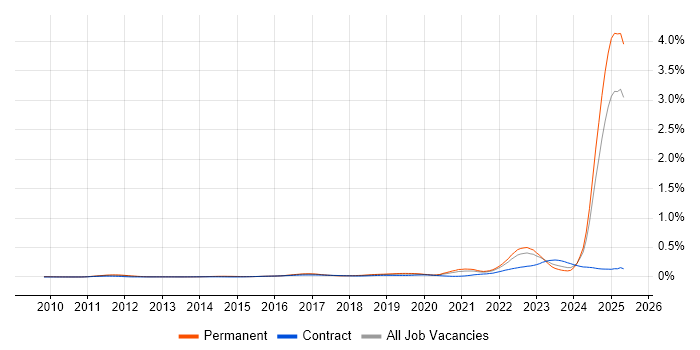Model-Based Systems Engineering
UK > UK excluding London
The table below provides summary statistics for permanent job vacancies advertised in the UK excluding London requiring Model-Based Systems Engineering skills. It includes a benchmarking guide to the annual salaries offered in vacancies that cited Model-Based Systems Engineering over the 6 months leading up to 17 May 2025, comparing them to the same period in the previous two years.
| 6 months to 17 May 2025 |
Same period 2024 | Same period 2023 | |
|---|---|---|---|
| Rank | 45 | 651 | 525 |
| Rank change year-on-year | +606 | -126 | +197 |
| Permanent jobs citing Model-Based Systems Engineering | 2,021 | 104 | 226 |
| As % of all permanent jobs advertised in the UK excluding London | 5.09% | 0.15% | 0.38% |
| As % of the Processes & Methodologies category | 5.48% | 0.17% | 0.40% |
| Number of salaries quoted | 861 | 89 | 35 |
| 10th Percentile | £37,574 | £44,600 | - |
| 25th Percentile | £47,683 | £47,500 | £40,371 |
| Median annual salary (50th Percentile) | £52,600 | £55,000 | £55,000 |
| Median % change year-on-year | -4.36% | - | +20.88% |
| 75th Percentile | £60,265 | £57,500 | £60,000 |
| 90th Percentile | - | £65,000 | £79,400 |
| UK median annual salary | £52,600 | £55,000 | £55,000 |
| % change year-on-year | -4.36% | - | +10.00% |
All Process and Methodology Skills
UK excluding London
Model-Based Systems Engineering falls under the Processes and Methodologies category. For comparison with the information above, the following table provides summary statistics for all permanent job vacancies requiring process or methodology skills in the UK excluding London.
| Permanent vacancies with a requirement for process or methodology skills | 36,887 | 59,718 | 56,668 |
| As % of all permanent jobs advertised in the UK excluding London | 92.92% | 83.64% | 95.62% |
| Number of salaries quoted | 18,036 | 41,241 | 29,108 |
| 10th Percentile | £26,902 | £27,250 | £30,500 |
| 25th Percentile | £37,574 | £36,250 | £40,000 |
| Median annual salary (50th Percentile) | £51,810 | £50,000 | £55,000 |
| Median % change year-on-year | +3.62% | -9.09% | +4.76% |
| 75th Percentile | £65,000 | £65,000 | £70,000 |
| 90th Percentile | £78,750 | £77,500 | £82,500 |
| UK median annual salary | £57,500 | £55,000 | £61,000 |
| % change year-on-year | +4.55% | -9.84% | +1.67% |
Model-Based Systems Engineering
Job Vacancy Trend in the UK excluding London
Job postings citing Model-Based Systems Engineering as a proportion of all IT jobs advertised in the UK excluding London.

Model-Based Systems Engineering
Salary Trend in the UK excluding London
3-month moving average salary quoted in jobs citing Model-Based Systems Engineering in the UK excluding London.
Model-Based Systems Engineering
Salary Histogram in the UK excluding London
Salary distribution for jobs citing Model-Based Systems Engineering in the UK excluding London over the 6 months to 17 May 2025.
Model-Based Systems Engineering
Job Locations in the UK excluding London
The table below looks at the demand and provides a guide to the median salaries quoted in IT jobs citing Model-Based Systems Engineering within the UK excluding London region over the 6 months to 17 May 2025. The 'Rank Change' column provides an indication of the change in demand within each location based on the same 6 month period last year.
| Location | Rank Change on Same Period Last Year |
Matching Permanent IT Job Ads |
Median Salary Past 6 Months |
Median Salary % Change on Same Period Last Year |
Live Jobs |
|---|---|---|---|---|---|
| North of England | +343 | 681 | £50,055 | +0.11% | 30 |
| North West | +259 | 637 | £50,055 | -1.68% | 21 |
| Midlands | +279 | 579 | £40,101 | -19.80% | 29 |
| West Midlands | +227 | 359 | £65,000 | +8.33% | 27 |
| Scotland | - | 330 | £58,033 | - | 6 |
| South West | +209 | 236 | £52,600 | -4.36% | 40 |
| East Midlands | +149 | 220 | £40,101 | -19.80% | 2 |
| South East | +196 | 129 | £40,101 | -19.80% | 32 |
| Yorkshire | +103 | 44 | £40,101 | -19.80% | 9 |
| East of England | +65 | 42 | £40,101 | -27.09% | 27 |
| Wales | - | 21 | £40,101 | - | 1 |
| Northern Ireland | - | 3 | - | - | 1 |
| Model-Based Systems Engineering UK |
|||||
Model-Based Systems Engineering
Co-occurring Skills and Capabilities in the UK excluding London by Category
The follow tables expand on the table above by listing co-occurrences grouped by category. The same employment type, locality and period is covered with up to 20 co-occurrences shown in each of the following categories:
|
|
|||||||||||||||||||||||||||||||||||||||||||||||||||||||||||||||||||||||||||||||||||||||
|
|
|||||||||||||||||||||||||||||||||||||||||||||||||||||||||||||||||||||||||||||||||||||||
|
|
|||||||||||||||||||||||||||||||||||||||||||||||||||||||||||||||||||||||||||||||||||||||
|
|
|||||||||||||||||||||||||||||||||||||||||||||||||||||||||||||||||||||||||||||||||||||||
|
|
|||||||||||||||||||||||||||||||||||||||||||||||||||||||||||||||||||||||||||||||||||||||
|
|
|||||||||||||||||||||||||||||||||||||||||||||||||||||||||||||||||||||||||||||||||||||||
|
||||||||||||||||||||||||||||||||||||||||||||||||||||||||||||||||||||||||||||||||||||||||
